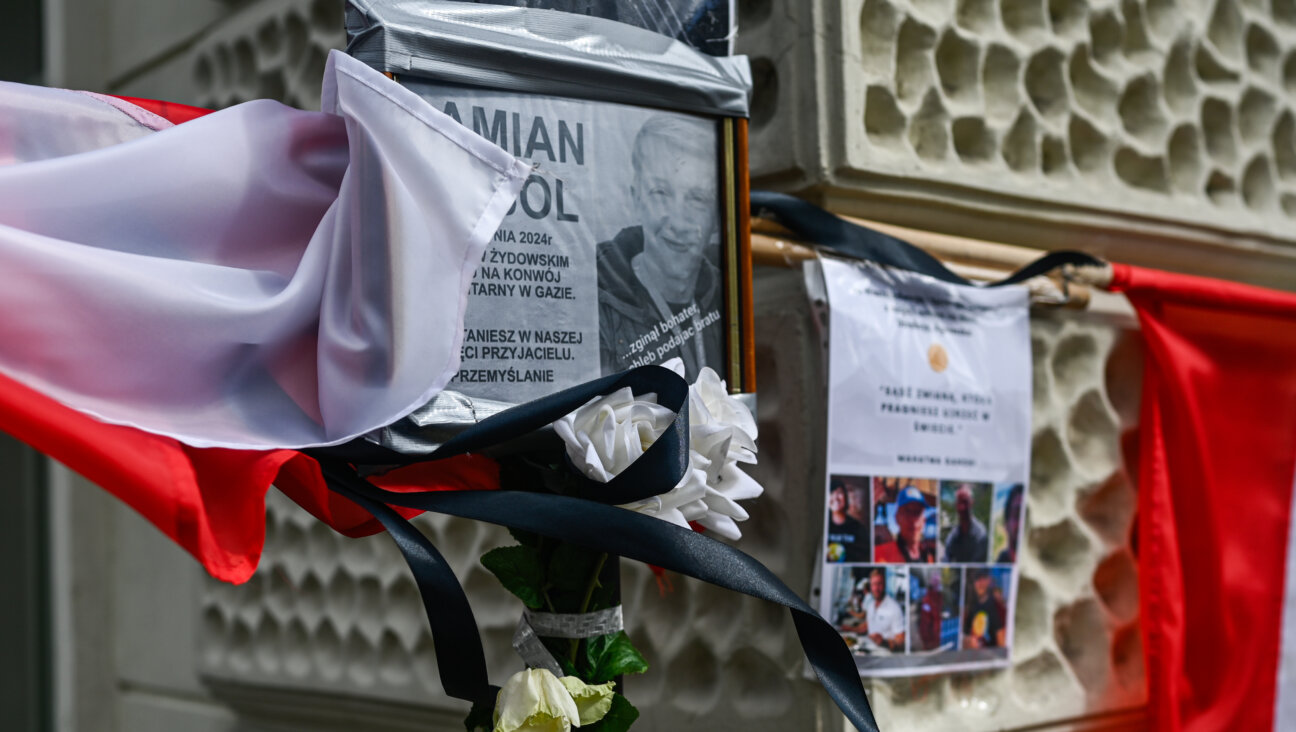S. Yizhar’s Birth of a Nation
Preliminaries
By S. Yizhar
Translated by Nicholas de Lange
The Toby Press, 312 pages, $24.95.
A memoir of an extraordinary life written in an ordinary manner is no great memoir. A memoir of an ordinary life written in an extraordinary manner is no great memoir, either. But what of a memoir of an extraordinary life written in a manner so extraordinary, so loving and lavishly ravishing, that it transcends the genre of individual autobiography to become, instead, a biography of an entire nation, the true account of its most hidden soul?
That would describe S. Yizhar’s “Preliminaries,” the first volume of one of last century’s greatest, most masterful and yet also most underappreciated attempts to line down real mind and “real time” on paper. A book of this ambition and quality is immoral to summarize, and foolish to encapsulate by comparison. Here is, or should be, a classic of world literature, and anyone, anywhere, who has anything to say about the existence of Israel and the morally formative days of practical Zionism should, before opening his mouth, take this book into his hands and read it into his heart.
S. Yizhar was the pen name of Yizhar Smilansky, born in 1916 in Rehovot, in Ottoman Palestine, to Russian immigrants of the pioneer intelligentsia. Despite S.Y. Agnon’s Nobel Prize, and the worldwide popularly of the easier-to-assimilate Amos Oz and A.B. Yehoshua, Yizhar was the greatest, and is still regarded as the greatest, Hebrew prose writer in the brief modern history of the language. Digging deeper through archaeological letters, Yizhar’s only rival in Hebrew might be the prophet Jeremiah, or the author of “Ecclesiastes,” rabbinically regarded as King Solomon himself.
Yizhar’s many books include “The Days of Ziklag,” an enormous epic of Israel’s 1948 War of Independence (his most widely read, the collection “Midnight Convoy and Other Stories” will be republished, also on Toby Press, this summer). “Ziklag” is Yizhar’s masterpiece, and is still untranslated — at 1,200 pages of dense, ecstatic prose, it is, perhaps, untranslatable. Yizhar himself fought in that war, and later became a member of the Knesset, where he served as a representative of the left-wing Mapai party for nearly two decades. All of Israel’s major prizes were his, as was the respected irrelevance of being a stylistically difficult, truly experimental writer in a language that was often his audience’s second, third or even fourth.
In the early 1990s, having exhausted his scriptural allotment of 70 years, Yizhar commenced the composition of his memoir, or memoirs. “Preliminaries” was the first volume, published in 1992 as “Mikdamot” (in his introduction, Dan Miron offers an excellent analysis of this strange plural word, invoking both poetry and music — mikdam, a noun, meaning an “anacrusis,” or unaccented introduction to a verse or melody — and the rhetorical precept of an invocation, or “preliminary remarks,” through mikdami, an adjectival form).
Four volumes followed, through 1998: “Radiances,” “Asides,” “By the Sea” and “Lovely Malcolmia.” In these late, lightly fictionalized pages, Yizhar summated the Zionist ideal as he lived it — as a “liberal” in not only his Knesset politics but also in his sympathetic narrative eye, in his ear for the dialogue of unspoken truth, his writerly sensitivity for the manner in which contemporary identity often fails historical birthright. He died in 2006, eight years after the publication of his last volume, a venerated if embattled prophet.
Here, the life is extraordinary because the prose is extraordinary: As in every one of his books, style is bound to its substance in a manner reminiscent of the vanguard English literature that Yizhar took as mandate. “Preliminaries” is the work of a Virginia Woolf raised among the heat and the orange groves; that of a James Joyce sojourning amid Araby.
Writing in both third and first person, seeming to live in both third and first person, Yizhar introduces himself as an infant in Rehovot, left alone in the fields, his father working the plow, his mother at home. Wasps sting him terribly; the ensuing ride to the doctor sets the narrative cart-and-mule in rollicking motion. What follows is a set of theme and variations on Zionism as perception, and Zionism as self-perception; the hardship of the Smilansky family is the hardship of the nascent state itself: Yizhar’s mother soon tires of the fields, and longs for culture, sociality. The family moves to the unmade city, Tel Aviv. But from the very beginning, it seems, the best cultural hopes of a pioneer generation are sullied: Movie theaters are erected as if altars to Hollywood film, whose spectacle distracts from socialist politics and transcendent European art. The Kiosk Coffee House, newly opened on the corner of Montefiore and Nahalat Binyamin Streets, seduces, with its fruity seltzer drinks and gramophone American jazz.
Women are discovered, as is Beethoven, Dostoyevsky’s “Crime and Punishment” and Dickens’s “‘The Posthumous Papers of the Pickwick Club,’ translated by Y.H. Taviov and B. Krupnik, Stiebel Publishing Co., 1929.” In other passages the “New Jew” is described, as is the perfection of the mechanical process that packs and ships Jaffa oranges to London — unbruised. All is observed closely, familially, with the utmost compassion: Yizhar’s father, Ze’ev Smilansky, incompetent farmer and amateur accountant, founder of the Young Worker Party and nightly author of unsigned agricultural articles; his mother, a loving, Slavic-souled worrier; his brother, a bronzed soccer-god. Bound Yizhar in a nutshell, per Shakespeare, and count him the king not only of infinite space and its café coterie but of the soil of that space, too, and its air; from the Jerusalem hills and the mountains of the Golan down to a lone corkscrewy carob pod and the formations of noontide’s marching ants. Such intense natural and human description links the quickly lived life to an almost posthumous, or superhuman, perception.
Though the book’s sentences are, in the end, page-by-page, still a preliminary, liminal wording of actual experience (which, like the desert and its jackals, is perhaps impossible to tame), the attempt itself at resurrecting the revelatory moment is phenomenal, and worthy of the greatest of Faulkner or Proust. Here, translator Nicholas de Lange deserves the reader’s highest acclaim and respect.
In English, “Preliminaries” is a work of genius, but in Hebrew it’s tenfold as stunning, almost otherworldly — not only in the immediate quality of its writing but also in the way in which such writing draws wells’ water from the past in order to cool Israel’s modern, and daily spoken, idiom. But as the only way to prove the worth of any translation — whether that between languages, or that from the historical to the personal present — is to quote, and as the only way to quote Yizhar is at length, in the breath, or breathlessness, of a sentence, what ends this appreciation is an average formulation of his that, as it preliminarily or peripherally regards Ben Yehuda’s codification of the Hebrew language itself, contains multitudes in its wise and generous calm.
“But when classes are finally over, and the wonderful after-school time arrives, you can always tell them at home that they had an extra lesson, or they have been to an extra gardening class and dug in the sand, or they have been rehearsing the end-of-year play, Daniel and Belshazzar, or Jephthah and his Daughter, or Trumpeldor, in Galilee, in Tel-Hai, or that they have been putting up posters on shops saying ‘HEBREW, SPEAK HEBREW,’ or any other plausible excuse, then the whole fun-loving, long-legged gang are free to kick a rag ball around exactly as they have recently seen a team of British gunners from Sarafend play a team of British police from Jaffa right here, on this empty sandy plot of land, how they kicked a real ball between the posts their Arab had put up for them in the sand, red shirts and socks versus green ones, sinking into the deep sand that had no pretensions to be a football pitch, kicking with all their strength in the soft sand at their real, inflated ball, going all red, even the greens went red and wet with sweat and shiny with wet, surrounded, apart from their Arab, by lots of Jewish kids burning with envy and aflame with curiosity and with the little English they had calling a penalty pendel and a half-back haff-beck, and screaming gol whenever one side scored, and everything about them was so foreign, so fascinating, so magical, because there is no Maccabi or Maccabi Tel Aviv yet, or Maccabi versus Hakoach, and there is no name of a single football star yet, no brilliant player, except perhaps the brothers Asaph and Amihud who are almost heroes, only they never play with nothing players like us and they and their friends don’t play in the sand but were invited and taken in an automobile to the real pitch in Sarafend and there they had a good time, they had it easy, and they smoked English cigarettes with that aroma of theirs, and drank the bitter English drinks, and even spoke English, even as their famous father sat hidden away in his home on Gruzenberg Street for days on end compiling the great Hebrew Dictionary.”
Joshua Cohen is a literary critic for the Forward.






















